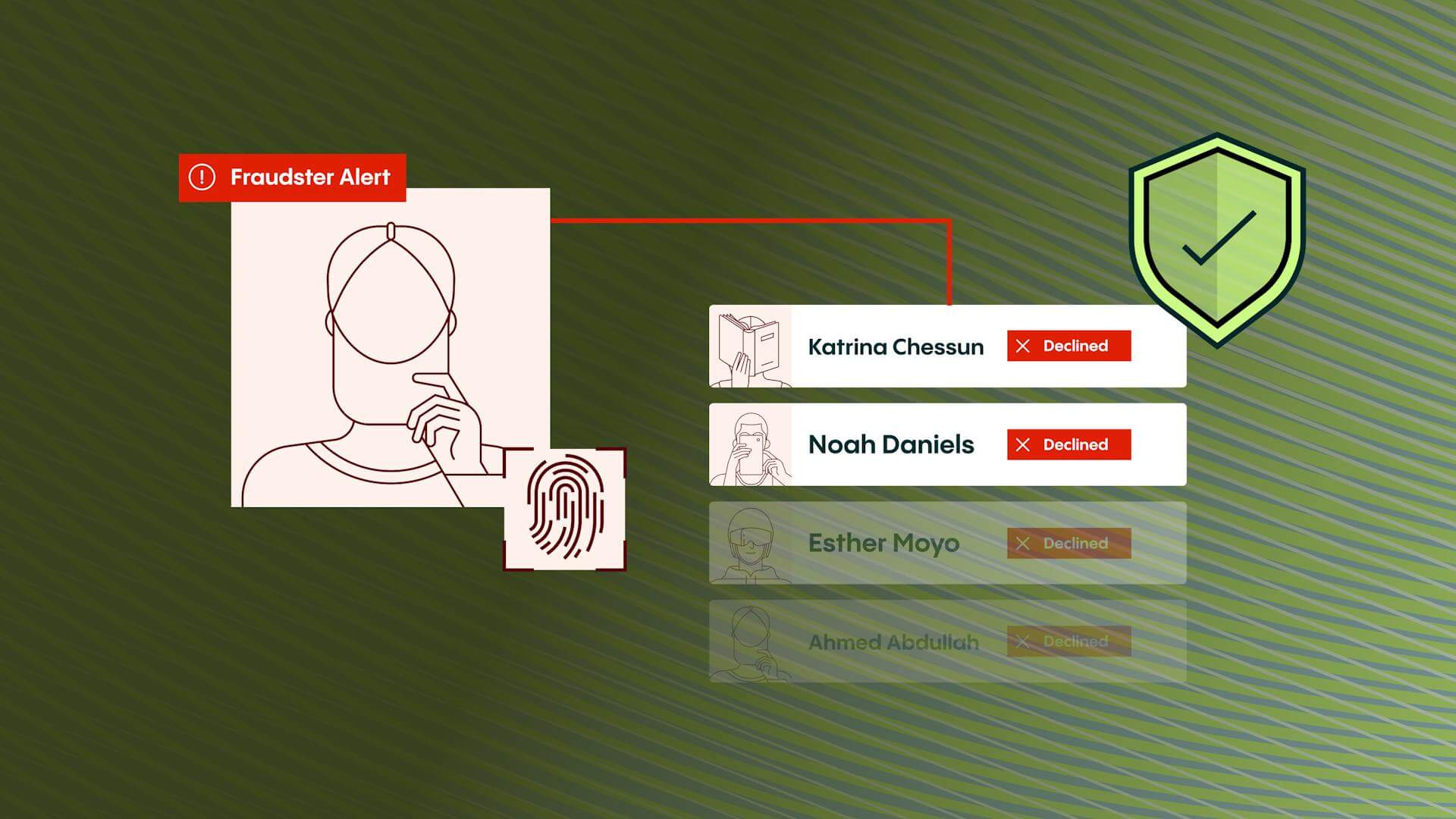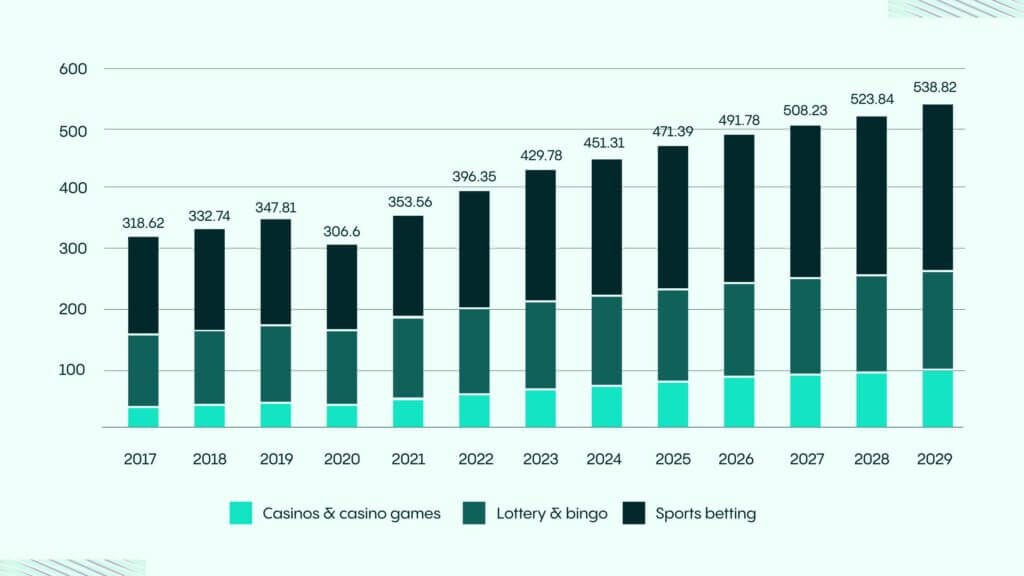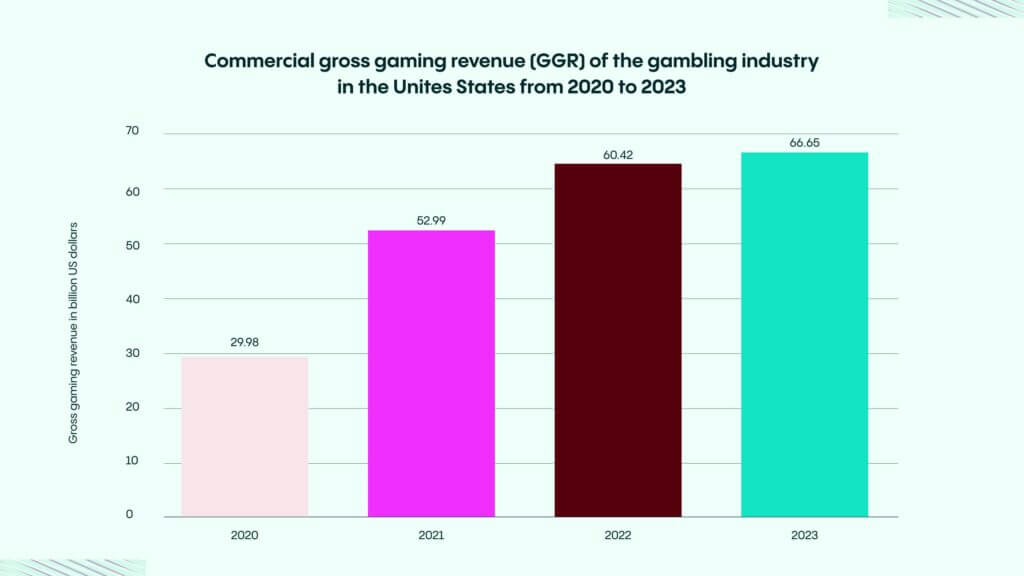Fraud Article
Anti-Money Laundering (AML) regulations in the gambling industry: A global perspective
The global gambling industry has surged past $471 billion, but with growth comes increased risks, particularly financial crime. From virtual casinos to mobile betting, the digital boom has amplified the fight against money laundering. Learn how the US, UK, and LATAM are enhancing AML efforts and why identity verification is crucial for a safer, more trusted gaming experience.

The global gambling market is projected to achieve revenue of $471.40 billion by 2025, driven by a compound annual growth rate (CAGR) of 3.40% from 2025 to 2029, ultimately reaching $538.82 billion by 2029. The casino and casino games segment will play a significant role, with an anticipated contribution of $239.53 billion in revenue by 2025.

In the context of compliance, regulation, and identity verification, the terms “gaming” and “gambling” are often used interchangeably—though they may carry slightly different connotations across jurisdictions. In this blog, we use both terms to describe activities that involve wagering money or valuable stakes on outcomes influenced by chance, including online casinos, sports betting, fantasy sports, and lottery platforms. Whether referred to as gaming or gambling, the industry is under growing scrutiny as global markets evolve and adopt stricter Anti-Money Laundering (AML) regulations. In this piece, we explore how regional frameworks in the United States, United Kingdom, and Latin America (LATAM) respond to financial crime risks—and how identity verification plays a vital role in building trust, maintaining compliance, and enabling sustainable growth. Let’s dive in!
Key trends shaping the global AML gambling landscape
The global online AML gaming and gambling market is undergoing significant growth, driven by shifting customer preferences, advances in technology, and evolving regulatory frameworks. The data pertains to B2C enterprises and is measured based on Gross Gambling Revenue (GGR), reflecting the total amount consumers spend on these products and services:
Customer preferences
AML-compliant online gambling platforms have become a preferred choice for players due to their convenience and accessibility. The ability to gamble anytime, anywhere, has positioned these platforms as a dominant force in the industry. With a wide variety of games and betting options tailored to diverse customer segments, operators successfully capture a broad user base.
Market trends
Mobile gambling is a transformative trend, powered by the widespread adoption of smartphones and high-speed internet. Operators are capitalizing on this shift, offering seamless, mobile-optimized platforms to enhance user experience. Social features such as chat rooms and leaderboards are further integrated to boost engagement and foster community-driven interactions, strengthening user loyalty.
Regional influences
Regulatory frameworks play a critical role in shaping market dynamics. In regions with legalized and regulated online gambling, secure environments encourage participation from both operators and players, driving growth. Conversely, restrictive or prohibitive regulations present legal complexities, often redirecting players to offshore platforms, resulting in revenue loss for local markets.
Macroeconomic factors
The industry’s expansion is closely tied to macroeconomic conditions. Regions with higher disposable incomes and strong consumer spending see increased demand for online gambling services. Moreover, the availability of high-speed internet and secure payment systems is essential to delivering reliable online gambling experiences, further driving adoption in well-equipped regions.
In summary, the global online gambling market is shaped by evolving customer preferences, the rise of mobile gambling, varied regulatory landscapes, and macroeconomic conditions. Key drivers, such as mobile optimization, the integration of social features, and the development of secure digital infrastructures, are critical for sustained growth. Operators capable of leveraging these factors while adhering to regulatory standards are well-positioned for long-term success.

Curious about Brazil’s booming iGaming industry?
Learn how new regulations are shaping the market—and what operators need to know to stay compliant and win player trust.
The global regulatory landscape for AML in gambling
The rapid expansion of online gambling introduces critical challenges in player safety, financial crime prevention, and regulatory oversight. As the market grows, risks such as money laundering and other financial crimes intensify. To address these concerns, jurisdictions globally are strengthening Anti-Money Laundering (AML) frameworks specific to the gambling sector.
United States: Complex legal landscape and strong AML enforcement
The United States is positioned to lead the market, forecasting a revenue of $121.29 billion in 2025. Average revenue per user (ARPU) in the gambling sector is expected to reach $514.05 by 2025, with a projected user base growth of 977.3 million by 2029 and a penetration rate of 11.8% by 2025. This data underscores the sector’s continued growth trajectory and highlights critical opportunities within the industry. The United States remains one of the most prominent gambling markets globally, home to iconic hubs like Las Vegas and Atlantic City. While gambling laws vary by state, the industry is deeply embedded in the country’s cultural and economic landscape. In 2023, national commercial gross gaming revenue (GGR) reached $66.65 billion, with casino slots and table games accounting for roughly 75% of the total. Nevada led the way with over $15 billion in GGR, followed by Pennsylvania at $5.86 billion—figures that emphasize gambling’s vital role in state economies and national revenue streams.
Gambling in the U.S. operates under a dual regulatory framework, where federal law permits it, but individual states establish their regulations. This creates a complex legal environment, with certain forms of gambling allowed in one state but prohibited in another. For example, following the 2018 federal legalization of sports betting, 38 states had adopted similar measures by September 2024. Of these, eight states restrict sports betting to in-person venues only.
State and federal discrepancies further complicate compliance efforts. A key example is the classification of daily fantasy sports (DFS) in Nevada. While the Nevada Gaming Control Board defines DFS as gambling, requiring operators to hold a gaming license, leading platforms argue that the 2006 Unlawful Internet Gambling Enforcement Act categorizes fantasy sports as games of skill, exempting them from gambling regulations. As of 2024, this legal ambiguity remains unresolved, preventing platforms like DraftKings and FanDuel from operating in Las Vegas, a global hub for gambling.
Navigating these regulatory complexities is essential for maintaining compliance within the U.S. gambling industry. Strict anti-money laundering (AML) measures are also enforced to prevent illicit financial activities, underscoring the importance of robust compliance protocols. Understanding and adhering to these frameworks ensures operational security and supports trust within this highly regulated sector.

Key AML regulatory authorities (US):
- Financial Crimes Enforcement Network (FinCEN): Monitors and enforces AML compliance in casinos and financial institutions.
- Bank Secrecy Act (BSA): Requires gambling establishments to report transactions exceeding $10,000.
- State-Level Gaming Commissions: Enforce local AML regulations for land-based and online casinos.
United Kingdom: A global leader in AML compliance for gambling
The United Kingdom is known for having one of the most advanced regulatory landscapes when it comes to gambling, placing strong focus on anti-money laundering (AML) compliance. Across the Atlantic, the United Kingdom’s gambling industry also demonstrates robust growth. From April 2023 to March 2024, the UK generated a total gross gambling yield (GGY) of £15.6 billion—a 3.5% increase from the previous year and a notable 10.2% rise compared to pre-pandemic levels. These numbers reflect not only a resilient industry but also increasingly dependent on digital channels and evolving consumer behaviors.
The UK Gambling Commission (UKGC) is the primary authority overseeing this area, requiring licensed gambling operators to apply robust AML practices. These include Customer Due Diligence (CDD) and Enhanced Due Diligence (EDD) to assess and manage risks, especially for high-risk individuals.
Additional oversight comes from the Financial Conduct Authority (FCA) and HM Revenue & Customs (HMRC), which help safeguard financial integrity and ensure tax compliance across the sector. According to industry data from November 2024, the UK’s gambling market generated £15.6 billion in gross gambling yield (GGY), highlighting its economic significance. With close to 2,000 operators under UKGC regulation, the industry operates under strict transparency and accountability standards.
To support these efforts, mandatory AML training ensures staff are well-prepared to detect and report suspicious activity. Together, these controls demonstrate the UK’s ongoing commitment to promoting a safe and compliant gambling environment.
Key AML regulatory authorities (UK):
- UK Gambling Commission (UKGC): Leads AML enforcement for licensed gambling operators.
- Financial Conduct Authority (FCA): Supervises financial institutions to help prevent money laundering.
- HM Revenue & Customs (HMRC): Ensures adherence to tax and financial regulations.
Key AML compliance requirements in UK gaming:
- Customer Due Diligence (CDD): Operators must verify customer identity and source of funds, particularly for large transactions.
- Enhanced Due Diligence (EDD): Additional checks for high-risk customers.
- AML Training: Staff must be trained to identify and report suspicious behavior.
LATAM: Emerging growth and regulatory momentum in AML gaming compliance
Latin America is emerging as one of the most dynamic and fast-evolving gambling regions. Driven by digital transformation, increased smartphone penetration, and a young, sports-obsessed population, markets such as Brazil, Mexico, Colombia, Peru, and Argentina are experiencing rapid growth. Among these, Brazil is undergoing a historic regulatory shift that legalizes both sports betting and online gambling—positioning it to become the largest gambling market in the region.
This transformation is attracting global operators eager to tap into LATAM’s growth potential. However, the region still faces challenges such as regulatory fragmentation, inconsistent tax structures, and the presence of black-market activity. As legislation advances, so do expectations for transparency, licensing, and compliance with anti-money laundering (AML) frameworks.
To better understand Brazil’s regulatory approach and what it means for operators, check out our in-depth breakdown:
👉 iGaming in Brazil: A guide to Brazil’s sports betting regulation
As Paulo Samia, CEO of Universo Online (UOL), puts it:
“Regulation is good for every player in the market, and every agent working in the market,” UOL chief executive Paulo Samia says. “It’s going to make more people willing to understand a little bit more about this industry and willing to try the betting arena. Gambling becomes more credible, essentially. “People are going to feel more secure in placing that first bet.”
The influx of international operators will introduce increased opportunities, innovative products, and advanced advertising strategies for the media. This development underscores the diversification and growth potential within the industry, paving the way for enhanced offerings and engagement.
The LATAM region has been strengthening its AML regulations as the gaming market expands. Recent reforms in Mexico and Brazil have introduced stricter anti-money laundering (AML) controls for both online and land-based gambling operations. Similarly, Argentina and Colombia now require gambling operators to register with financial authorities to ensure AML compliance. Meanwhile, Chile and Peru are implementing new AML frameworks aimed at combating illicit financial activities in casinos, reflecting a broader regional effort to enhance financial integrity within the gambling sector.
Key regulatory authorities (LATAM):
- Secretariat of Prizes and Betting (SPA), Brazil: Formed under Brazil’s Ministry of Finance, the SPA is tasked with licensing and regulating fixed-odds betting and online gambling. As Brazil opens its market, the SPA will play a central role in enforcing compliance and market integrity.
- Coljuegos, Colombia: A pioneering authority in LATAM, Coljuegos regulates both land-based and online gambling. It is responsible for issuing licenses, overseeing AML compliance, and coordinating with financial entities to prevent illicit financial activity.
LATAM-specific AML measures:
- Mandatory reporting: Operators across LATAM must report suspicious and large-value transactions to national financial intelligence units.
- AML compliance programs: Licensed operators must implement internal policies and controls designed to detect and prevent money laundering.
- Cross-border cooperation: Regional regulators are increasingly collaborating with international AML bodies to share intelligence and bolster enforcement.

Regulation is good for every player in the market, and every agent working in the market. It’s going to make more people willing to understand a little bit more about this industry and willing to try the betting arena. Gambling becomes more credible, essentially. People are going to feel more secure in placing that first bet.
Helping operators meet AML obligations: Veriff’s role in AML gaming compliance
In the fast-paced world of online gaming, operators are under pressure to deliver seamless user experiences while staying compliant with ever-evolving regulations. From onboarding real players to detecting and preventing fraud, the demands are high. That’s where Veriff comes in.
At Veriff, we help gaming operators overcome these hurdles with powerful identity verification tools that prioritize speed, accuracy, and security—so you can focus on growth without compromising compliance.
Here’s how we support gaming operators every step of the way:
1. Verify players the first time
Conversion is everything in gaming—and nothing stalls growth like clunky verification flows. Veriff enables smooth, first-time verification for real players with a fast, user-friendly process that improves conversion rates. Our system helps ensure your players can start gaming without unnecessary delays or do-overs.
2. Make onboarding simple
We streamline the player onboarding experience with an intuitive, inclusive flow that works across platforms—whether your users prefer iOS, Android, or web. No friction, no frustration—just an easy path to gameplay.
3. Reduce errors with smart automation
Manual data entry can lead to errors that frustrate users and slow down onboarding. Veriff reduces this risk with AI-driven data extraction, which pre-fills information from government-issued IDs. It’s fast, accurate, and helps avoid unnecessary support tickets caused by simple mistakes.
4. Take a layered approach to fraud prevention
Fraud in gaming is evolving, and so are we. Veriff offers a multi-layered defense that includes face and document checks, device and network diagnostics, and video-based behavior analysis. From bonus abuse to chip dumping and multi-accounting, we help you stay one step ahead.
Veriff’s identity verification suite is designed to meet the high-speed, high-stakes demands of the iGaming industry. From seamless age validation that goes beyond simple document checks to advanced device and behavioral analytics that prevent underage access, Veriff helps operators stay compliant and build trust. The Identity Verification Solution offers a full-service onboarding flow tailored to real-time user verification, letting gaming platforms focus on performance while ensuring legitimacy. To support anti-money laundering efforts, Veriff provides automated AML screening, including real-time PEP and sanctions checks. For jurisdictions requiring deeper verification, Proof of Address is easily integrated into the process, ensuring full regulatory compliance. Together, these tools empower gaming companies to scale securely, reduce risk, and deliver a frictionless player experience.

Curious about Brazil’s booming iGaming industry?
Learn how new regulations are shaping the market—and what operators need to know to stay compliant and win player trust.
Case study: How Easygo/Stake met AML & KYC requirements with Veriff
A great example of successful implementation in the iGaming space is Veriff’s partnership with Easygo/Stake, a leading blockchain-based gaming company, to implement scalable AML and KYC solutions across multiple markets. By integrating Veriff’s identity verification and compliance solutions, EasygoStake enhanced its ability to onboard users swiftly while meeting strict regulatory requirements across multiple jurisdictions. Veriff’s robust identity checks and AML screening tools helped reduce the risk of fraud and ensure players met age and KYC compliance standards. This collaboration not only improved platform security, but also delivered a smoother, more trustworthy user experience—allowing EasygoStake to scale confidently while maintaining full compliance in an evolving regulatory landscape.
Conclusion
The global AML gambling and gaming ecosystem is evolving rapidly, with countries tightening financial crime controls to ensure industry integrity. Whether in the US, UK, or LATAM, regulatory compliance is no longer optional—it’s a critical driver of trust and long-term success. Operators who implement AML-compliant onboarding, continuous transaction monitoring, and automated identity checks will be best positioned to lead in this high-growth, highly regulated space.














